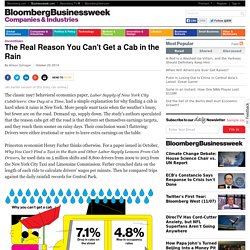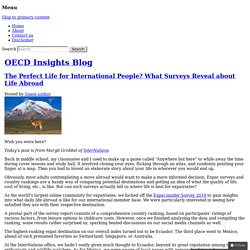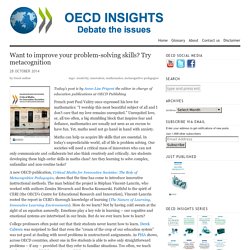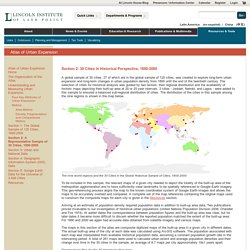

The Real Reason You Can't Get a Cab in the Rain. The classic 1997 behavioral economics paper, Labor Supply of New York City Cabdrivers: One Day at a Time, had a simple explanation for why finding a cab is hard when it rains in New York.

More people want taxis when the weather’s lousy, but fewer are on the road. Demand up, supply down. The study’s authors speculated that the reason cabs get off the road is that drivers set themselves earnings targets, and they reach them sooner on rainy days. Their conclusion wasn’t flattering: Drivers were either irrational or naive to leave extra earnings on the table. The Perfect Life for International People? What Surveys Reveal about Life Abroad. Wish you were here?

Today’s post is from Margit Grobbel of InterNations Back in middle school, my classmates and I used to make up a game called “Anywhere but here” to while away the time during cover lessons and study hall. It involved closing your eyes, flicking through an atlas, and randomly pointing your finger at a map. Want to improve your problem-solving skills? Try metacognition. Today’s post is by Anne-Lise Prigent the editor in charge of education publications at OECD Publishing French poet Paul Valéry once expressed his love for mathematics: “I worship this most beautiful subject of all and I don’t care that my love remains unrequited.”

Unrequited love, or, all too often, a big stumbling block that inspires fear and defiance, mathematics are usually not seen as an excuse to have fun. Yet, maths need not go hand in hand with anxiety. Maths can help us acquire life skills that are essential. Atlas of Urban Expansion: 30 Cities in Historical Perspective, 1800-2000. A global sample of 30 cities, 27 of which are in the global sample of 120 cities, was created to explore long-term urban expansion and long-term changes in urban population density from 1800 until the end of the twentieth century.

The selection of cities for historical analysis was guided by two factors: their regional distribution and the availability of historic maps depicting their built-up area at 20 or 25 year intervals. 3 cities - Jeddah, Nairobi, and Lagos - were added to this sample to ensured a balanced sub-regional distribution of cities. The distribution of the cities in this sample among the nine regions is shown in the map below. The nine world regions and the 30 Cities in the Global Historical Sample of Cities, 1800-2000. Take Back Your Mornings (Infographic) The first thing successful leaders do each morning.
University of Exeter/flickrSay "Good morning" with a smile.

Everyone's morning routine is different. Some professionals grab a cup of coffee and check their email as soon as they arrive at the office, while others spend those first few minutes organizing their desk and updating their to-do list. But the one thing all successful people do when they arrive at work, no matter their mood or schedule, is greet their teams. "This effort trumps all the organization you must eventually do at your desk for one important reason: No matter how strategic you are in planning your day, your results are tied directly to the efforts of a synergistic, motivated team," says Lynn Taylor, a national workplace expert and the author of "Tame Your Terrible Office Tyrant: How to Manage Childish Boss Behavior and Thrive in Your Job. " She says the first few minutes of each morning is an expected time to inspire fellow employees with a "healthy dose of respect and good old-fashioned kindness.
" What successful leaders do before leaving work. University of Exeter/flickrSuccessful people have an end-of-day routine.

Are you that person who flees the office every day at five o'clock on the dot, without making any eye contact on your way to the door? If so, you may want to reconsider your end-of-day routine. "The last 10 minutes of your workday have a strong influence on your next day at the office," says Lynn Taylor, a national workplace expert and the author of "Tame Your Terrible Office Tyrant: How to Manage Childish Boss Behavior and Thrive in Your Job.
" When will China overtake the US? TOKYO – The World Bank recently announced that China’s economy will surpass that of the United States this year, measured according to purchasing power parity (PPP).

But this is far from a holistic depiction of China’s global economic standing. Though PPP can serve some purpose in comparing welfare across countries, it is affected significantly by population size. India, the world’s tenth largest economy measured according to the market exchange rate of the US dollar and the Indian rupee, is the third largest in PPP terms. Moreover, power resources, such as the cost of imported oil or an advanced fighter aircraft engine, are better judged according to the exchange rates of the currencies that must be used to pay for them.
New ways of looking at cities. Cheshire and Uberti There is order and beauty in the chaos of your commute In 2013, Londoners took 2.4 billion bus journeys.

They were prescribed 116 million items by doctors, and found themselves joined by more than 1,750,000 American tourists. Meanwhile, in one small, financial corner of the capital, the population, in every 24-hour period of the year, spiked from 222 residents to more than 127,000. These staggering statistics are the work of geographer James Cheshire and visual artist Oliver Uberti, who have merged to create a new series of maps depicting London as "the most data-heavy capital in the world. " Why good leaders schedule downtime. If you were to see my calendar, you’d probably notice a host of time slots greyed out but with no indication of what’s going on.

There is no problem with my Outlook or printer. The grey sections reflect “buffers,” or time periods I’ve purposely kept clear of meetings. In aggregate, I schedule between 90 minutes and two hours of these buffers every day (broken down into 30- to 90-minute blocks). 5 Powerful Ways to Boost Your Confidence. Does regret lead to bad investment decisions? The leading normative theory in economics – expected utility theory – postulates that individuals should evaluate the options they face based only on these choices’ qualities.

The decision to sell a stock, for example, should be based only on the stock’s current price and expectations about the future – not on its historical prices. For many, however, selling a stock for €1,800 that just a few weeks ago was trading at €2,000 feels like a loss, and they are reluctant to realise this loss by selling the stock. People tend not to evaluate their current situation based solely on its own qualities. A new way to predict traffic flows. A reliable way of predicting the flow of traffic could be a great convenience for commuters, as well as a significant energy-saver. During an emergency evacuation following a natural disaster, reliable predictions of the best routes could even be a lifesaver.
Now a team of researchers from MIT, the University of Notre Dame, and elsewhere has devised what they say is an effective and relatively simple formula for making such predictions. The findings are reported in a paper in the journal Nature Communications by researchers including Marta Gonzalez, an assistant professor of civil and environmental engineering and engineering systems at MIT and lead author Zoltan Toroczkai and Yihui Ren at Notre Dame.